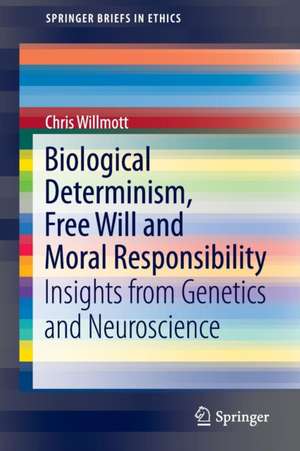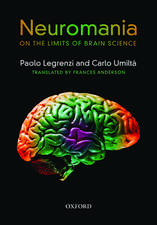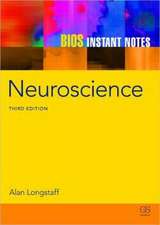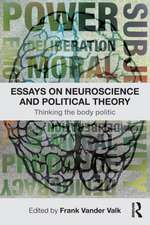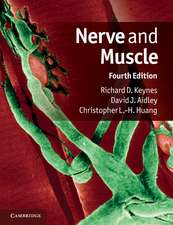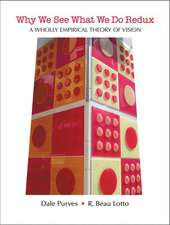Biological Determinism, Free Will and Moral Responsibility: Insights from Genetics and Neuroscience: SpringerBriefs in Ethics
Autor Chris Willmotten Limba Engleză Paperback – 16 mar 2016
Din seria SpringerBriefs in Ethics
-
 Preț: 84.28 lei
Preț: 84.28 lei -
 Preț: 377.18 lei
Preț: 377.18 lei -
 Preț: 343.13 lei
Preț: 343.13 lei -
 Preț: 353.67 lei
Preț: 353.67 lei -
 Preț: 377.18 lei
Preț: 377.18 lei -
 Preț: 408.44 lei
Preț: 408.44 lei -
 Preț: 474.84 lei
Preț: 474.84 lei -
 Preț: 343.21 lei
Preț: 343.21 lei -
 Preț: 378.71 lei
Preț: 378.71 lei -
 Preț: 410.77 lei
Preț: 410.77 lei -
 Preț: 377.95 lei
Preț: 377.95 lei -
 Preț: 378.34 lei
Preț: 378.34 lei - 15%
 Preț: 461.87 lei
Preț: 461.87 lei -
 Preț: 478.53 lei
Preț: 478.53 lei - 15%
 Preț: 461.73 lei
Preț: 461.73 lei -
 Preț: 377.95 lei
Preț: 377.95 lei -
 Preț: 376.80 lei
Preț: 376.80 lei -
 Preț: 377.95 lei
Preț: 377.95 lei -
 Preț: 477.34 lei
Preț: 477.34 lei -
 Preț: 350.81 lei
Preț: 350.81 lei -
 Preț: 377.95 lei
Preț: 377.95 lei -
 Preț: 174.24 lei
Preț: 174.24 lei -
 Preț: 477.17 lei
Preț: 477.17 lei -
 Preț: 476.57 lei
Preț: 476.57 lei -
 Preț: 476.79 lei
Preț: 476.79 lei -
 Preț: 478.71 lei
Preț: 478.71 lei -
 Preț: 174.83 lei
Preț: 174.83 lei -
 Preț: 259.41 lei
Preț: 259.41 lei -
 Preț: 259.57 lei
Preț: 259.57 lei -
 Preț: 408.44 lei
Preț: 408.44 lei -
 Preț: 259.19 lei
Preț: 259.19 lei -
 Preț: 410.55 lei
Preț: 410.55 lei - 15%
 Preț: 463.03 lei
Preț: 463.03 lei -
 Preț: 411.16 lei
Preț: 411.16 lei - 15%
 Preț: 463.03 lei
Preț: 463.03 lei -
 Preț: 475.06 lei
Preț: 475.06 lei -
 Preț: 374.08 lei
Preț: 374.08 lei -
 Preț: 408.82 lei
Preț: 408.82 lei -
 Preț: 375.45 lei
Preț: 375.45 lei
Preț: 414.72 lei
Nou
Puncte Express: 622
Preț estimativ în valută:
79.37€ • 86.18$ • 66.67£
79.37€ • 86.18$ • 66.67£
Carte tipărită la comandă
Livrare economică 18-24 aprilie
Preluare comenzi: 021 569.72.76
Specificații
ISBN-13: 9783319303895
ISBN-10: 3319303899
Pagini: 84
Ilustrații: XIII, 84 p.
Dimensiuni: 155 x 235 x 5 mm
Greutate: 0.15 kg
Ediția:1st ed. 2016
Editura: Springer International Publishing
Colecția Springer
Seria SpringerBriefs in Ethics
Locul publicării:Cham, Switzerland
ISBN-10: 3319303899
Pagini: 84
Ilustrații: XIII, 84 p.
Dimensiuni: 155 x 235 x 5 mm
Greutate: 0.15 kg
Ediția:1st ed. 2016
Editura: Springer International Publishing
Colecția Springer
Seria SpringerBriefs in Ethics
Locul publicării:Cham, Switzerland
Cuprins
Preface.- Chapter 1: Free will and determinism.- Chapter 2: Existing legislation on mental disorders and criminal cases.- Chapter 3: Biological Basis of Behaviour.- Chapter 4: Use of genetic and neuroscientific evidence in criminal cases: a brief history of “neurolaw”.- Chapter 5: Are we ready for an expanded use of neuroscientific evidence in the courtroom?.
Notă biografică
Chris Willmott is a Senior Lecturer in the Department of Molecular and Cell Biology at the University of Leicester, UK. Chris’ original research was on the molecular basis of antibiotic resistance, however for more than a decade his principal focus has been on bioethics. Chris has particular interests in bioethics education and in the media depiction of bioethical issues, including both factual and fictional representations. The present work emerges from a desire to distinguish the hope from the hype in regard to the role of genetics and neuroscience in the determination of our behaviour and thereafter our responsibility for any criminal activity.Chris was awarded a prestigious National Teaching Fellowship (Higher Education Academy, 2005) and in 2013 was runner-up in the National Bioscience Tutor of the Year (Society of Biology).
Caracteristici
Brings fresh scientific insight to debate about moral responsibility Examines the appropriate influence of contemporary science on criminal cases Reviews prior use of neurogenetic evidence in court cases ? Includes supplementary material: sn.pub/extras
